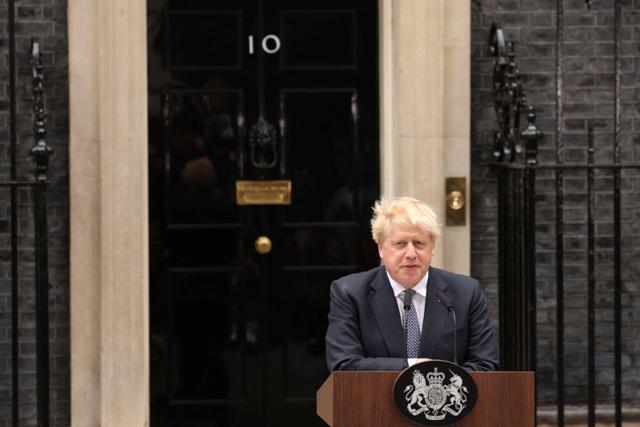 British Prime Minister Boris Johnson announces his departure in July 2022 . [photo: REUTERS via Alamy/ Phil Noble]
British Prime Minister Boris Johnson announces his departure in July 2022 . [photo: REUTERS via Alamy/ Phil Noble]
[This is an excerpt from an article in The Round Table: The Commonwealth Journal of International Affairs.]
Boris Johnson has had important ties with Australia over many years. Following the example of Prince Charles, he spent his ‘gap year’ in 1983 at the remote Timbertop campus of Geelong Grammar School (Australia’s Eton) in the Victorian Alps. As mayor of London (2008–2016) he won the UK Honorary Australian of the Year Award in 2014, being cited for displaying ‘archetypal Aussie characteristics in abundance and [flying] the flag for Australians in the UK’. He has been an advocate of closer political and economic ties between Australia and the United Kingdom, including free movement of people.
From an Australian perspective, Boris Johnson might be viewed as a ‘larrikin’, albeit with a touch of Eton and Oxford. Eschewing politics, he might have made his mark as a satirical writer, imaginative journalist and non-fiction author. Instead, he sought power; however, his character flaws, political misjudgements and scandalous behaviour have now resulted in his downfall.
Boris Johnson: the defenestration of a British prime minister
‘Is everything OK?’ – Boris Johnson, sleaze and Peppa Pig
United Kingdom: The apogee of Boris Johnson
COVID-19, Brexit and the United Kingdom – a year of uncertainty
In the case of Brexit, Johnson was the main advocate of the populist message, showing what can be won through exaggeration and oversimplified messages. He will forever be identified with Brexit, the consequences of which are now being seen, but with no ‘quick fix’ in sight.
Brexit has resulted in the United Kingdom-Australia free trade agreement (signed in December 2021), but does this compensate for Britain no longer being part of the European Union? There are some trade and other gains for Australia, but it is arguable as to whether Australia is better off. ‘Global Britain’ might mean a stronger British presence in the Asia-Pacific (but hardly of major significance), while Britain has less influence over the European Union (itself a global power). The European Union did not significantly restrict Britain in the conduct of its foreign policy. Johnson cooperated with Australia and the United States in inaugurating AUKUS in September 2021, but again it is arguable as to how positive an impact this development has had on Australian security; some would say that AUKUS is a ‘back to the future’ move, recalling the era of ‘great and powerful friends’ in the 1950s and 1960s when the world has now moved into the ‘Asian century’.
By Derek McDougall
Opinion – AUKUS: implications for Australia and other Commonwealth countries in the Indo-Pacific
Book Review – Tides that bind: Australia in the Pacific
Book Review: Australia and the World 1931-1936. Documents on Australian Foreign Policy
Given that Australia has very substantial interests at stake with its relationship to the United Kingdom, the prospect of instability while the Conservative Party chooses a new leader is of concern. A quick transition to a new leadership is desirable. While Prime Minister Anthony Albanese (Labor) declared that Australia would work with whoever the new British prime minister turned out to be, Wayne Swan (federal president of the Labor Party) was more forthright in advocating the immediate resignation of Johnson from the prime ministership in the interests of stability; in this scenario the deputy prime minister would become caretaker prime minister pending the Conservative Party choosing a new leader.
The interest shown by Australians in British politics – including the saga of Boris Johnson – is not just for sentimental reasons. What happens in British politics affects many other parts of the world, including Australia.
Derek McDougall is a Professorial Fellow at the School of Social and Political Sciences, University of Melbourne, Melbourne, Australia.



